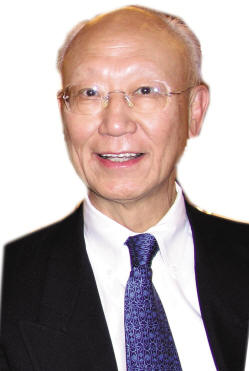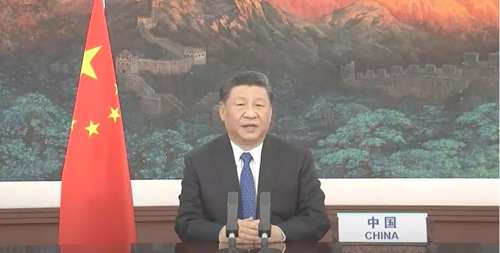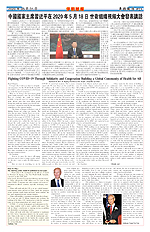|
|
|
|
其他城市
|
| |
|
|
|
|
|
|
Anthony Yuan Tai Yen to Puying
|
|
|
|
 Dear
Yu Ping ; Dear
Yu Ping ;
The following article should be published in your paper.
Please refer to the attachment for the full text of speech by
President Xi Jinping at the 73rd World Health Assembly, convened on
May 18th, 2020.
In his speech, President Xi made the following announcement:
— China will provide US$2 billion over two years to help with COVID-19
response and with economic and social development in affected
countries, especially developing countries.
— China will work with the UN to set up a global humanitarian
response depot and hub in China, ensure the operation of
anti-epidemic supply chains and foster “green corridors” for
fast-track transportation and customs clearance.
— China will establish a cooperation mechanism for its hospitals to
pair up with 30 African hospitals and accelerate the building of the
Africa CDC headquarters to help the continent ramp up its disease
preparedness and control capacity.
— COVID-19 vaccine development and deployment in China, when
available, will be made a global public good. This will be China’s
contribution to ensuring vaccine accessibility and affordability in
developing countries.
— China will work with other G20 members to implement the Debt
Service Suspension Initiative for the poorest countries. China is
also ready to work with the international community to bolster
support for the hardest-hit countries under the greatest strain of
debt service, so that they could tide over the current difficulties.
Anthony Yen Every religion promotes some form of the Golden Rule –
do unto others as you would have them do unto you. To treat others
with the respect or generosity we ourselves would want is
fundamentally a call for empathy, an exhortation for us to feel the
pain and needs of others. It is a plea to behave in a way that we
ourselves would find just and compassionate.
Empathy implies an interconnectedness with others, and the pandemic
has illuminated just how much we rely upon, and are affected by,
that lifeline to others. We could not survive without those
previously invisible workers who transport food to our grocery
stores or stock the shelves. Our welfare depends on the healthcare
workers aiding the sick and the researchers seeking a treatment and
a vaccine.
The pandemic has elicited remarkable moments of selflessness and
caring, whether it is serenading one’s neighbors, sewing masks to
fill a desperate shortage, or acknowledging the sacrifice of
essential workers who put themselves at risk to keep the rest of us
fed and healthy. Even if a stay-at-home order was imposed, most have
willingly sacrificed to avoid harming the most vulnerable and
themselves. The vast majority of people have risen to the challenge
and shown they can and do think about others.
This pandemic is a chance to recognize our inherent interdependence
- whether on a local, national or global scale. We’ve seen that when
the less fortunate in society are ill or lack the insurance to pay
for healthcare, it literally affects us all. High unemployment is
bringing great suffering to individual families, but it also creates
an immense responsibility that we all bear.
Globally, the rapid spread of the virus betrayed just how
meaningless are national borders. Problems occurring elsewhere
eventually become our own. To solve global problems like a pandemic,
climate change or economic collapse, it is in our national interests
to collaborate with other countries. While there are those who will
always act out of self-interest, the rest of us must reject
divisiveness and scapegoating that attempts to exploit fear for
political gain.
We must call upon our own country to earnestly collaborate for the
larger good just as we ourselves are demonstrating that concern on
our own streets and in our own cities. Let us approach with humility
those who have controlled the pandemic better and seek their
guidance. Let us share the knowledge and the tools that have served
us well. Let us offer those in need what resources we can spare. Let
us have open and frank conversations about how to better prepare for
the next challenge. Let us harness the world’s ingenuity and
collaborate with China or any other country on the development of
solutions, whether for this pandemic or climate change. Let us
demonstrate that we have been transformed by this cataclysmic event
and that we now understand and embrace the interconnectedness that
binds us all together.
Anthony Yuan Tai Yen |
|
|
|
|
 |
|
|
|
|
|
|
|
|
|
|
|
中國國家主席習近平在2020年5月18日 世衛組織視頻大會發表講話 |
|
|
|
中國國家主席習近平今天應世衛組織秘書長譚德塞邀請,于世界衛生大會視訊會議開幕式上致詞表示,中國官方媒體及時報吿習近平講話內容,習近平稱中國“始終本着公開、透明、負責任的態度”,及時通報疫情。習近平講話中還提出了6點建議。
據中央社今天報道説,習近平受邀WHA致詞,稱通報疫情本着公開透明態度。
中國國家主席習近平應世衛組織秘書長譚德塞邀請,于世界衛生大會視訊會議開幕式上致詞表示,中國“始終本着公開、透明、負責任的態度”,及時通報疫情。世界衛生大會(WHA)視訊會議今天日內瓦時間中午12時登場,今年因2019冠狀病毒疾病疫情蔓延全球,WHA史上首度以視訊會議形式舉行。世界衛生組織(WHO)雖將會員國報名與會時間延長至開會前,但連續第4年拒台灣于門外。
據中央社引述習近平受邀發言指出,人類正在經歷第二次世界大戰結束以來,最嚴重的全球公共衛生突發事件。新冠肺炎疫情突如其來,現在已經波及210多個國家和地區,影響70多億人口,奪走30余萬人的寶貴生命。他要向不幸罹難者表示哀悼,向他們的家屬表示慰問。
習近平表示,經過艱苦卓絶努力,付出巨大代價,中國有利扭轉了疫情局勢,維護人民生命安全和身體健康。“中方始終本着公開、透明、負責任的態度”,及時向世衛組織及相關國家通報疫情訊息,第一時間發佈病毒基因序列等訊息,毫無保留和各方分享防控和救治經驗,盡其所能爲有需要國家提供大量支持和幫助。
習近平並提出6點建議。第一,全力搞好疫情防控,這是當務之急。要堅持以民爲本、生命至上,科學調配醫療力量和重要物資。在防護、隔離、檢測、救治、追踪等重要領域採取有力舉措,儘快遏止疫情在全球蔓延態勢,盡力阻止疫情跨境傳播。要加強訊息分享,交流有益經驗和做法,開展檢驗方法、臨床救治、疫苗藥物硏發國際合作,並繼續支持各國科學家們開展病毒源頭和傳播途徑的全球科學硏究。
他表示,第二,發揮世衛組織領導作用,在譚德塞(Tedros Adhanom Ghebreyesus)帶領下,世衛組織爲領導和推進國際抗疫合作做出重大貢獻,國際社會對此高度贊賞。
習近平指出,當前國際抗疫正處于關鍵階段,“支持世衛組織就是支持國際抗疫合作、支持挽救生命”。中國呼籲國際社會加大對世衛組織政治支持和資金投入,調動全球資源,打贏疫情狙擊戰。
習近平並提出,第三,要加大對非洲國家支持,應該向非洲國家提供更多物資、人力支持。在過去70年,中國派往非洲的醫療隊,爲2億多人次非洲人民提供醫療服務,目前常駐非洲的46支中國醫療隊正在投入當地抗疫行動。
他表示,第四,加強全球公共衛生治理。人類終將戰勝疫情,但重大公共衛生突發事件對人類來説不會是最後一次。要針對這次疫情暴露出的短板(短處)和不足,完善公共衛生安全治理體系,提高突發公共衛生事件應急響應速度,建立全球和地區防疫物資儲備中心。
習近平説,中國支持在全球疫情得到控制之後,全面評估全球應對疫情工作,總結經驗,彌補不足。這項工作需要科學專業態度,需要世衛組織主導,堅持客觀公正原則。
習近平表示,第五是恢復經濟社會發展。有條件的國家要在做好常態化疫情防控的前提下,遵照世衛組織專業建議,有序開展復工、復産、復學,加強國際宏觀經濟政策協調,維護全球産業鏈、供應鏈穩定暢通,盡力恢復世界經濟。
第六是加強國際合作。習近平宣佈,中國將在2年內提供20億美元國際援助,用于支持受疫情影響的國家,特別是發展中國家抗疫鬥爭,以及經濟社會恢復發展。
該報道説,習近平還表示,中國將與聯合國合作,在華設立全球人道主義應急倉庫和樞紐,努力確保抗疫物資供應鏈,並建立運輸和清關緑色通道。中國將建立30個中非對口醫院合作機制,助力非洲提陞疫病防控能力。
習近平表示,中國新冠疫苗硏發完成並投入使用後,將作爲全球公共産品,爲實現疫苗在發展中國家的可及性和可擔負性做出貢獻。中國將與20國集團成員一道,落實暫緩最貧困國家債務償付倡議,並願與國際社會一道,加大對疫情特別重、壓力特別大的國家的支持力度,幫助克服當前困難。 |
|
|
|
|
|
|
|
Fighting COVID-19
Through Solidarity and Cooperation Building a Global Community of
Health for All
Statement by H.E. Xi Jinping President of the
People’s Republic of China Dear Delegates,
To begin with, I wish to say that it is of
significant importance for this World Health Assembly to be held at
such a critical moment as the human race battles this novel
coronavirus.
What we are facing is the most serious global public health
emergency since the end of World War II. Catching the world by
surprise, COVID-19 has hit over 210 countries and regions, affected
more than seven billion people around the world and claimed over
300,000 precious lives. I mourn for every life lost and express
condolences to the bereaved families.
The history of human civilization is one of fighting diseases and
tiding over disasters. The virus does not respect borders. Nor is
race or nationality relevant in the face of the disease. Confronted
by the ravages of COVID-19, the international community has not
flinched. The people of all countries have tackled the virus head
on. Around the world, people have looked out for each other and
pulled together as one. With love and compassion, we have forged
extraordinary synergy in the fight against COVID-19.
In China, after making painstaking efforts and enormous sacrifice,
we have turned the tide on the virus and protected the life and
health of our people. All along, we have acted with openness,
transparency and responsibility. We have provided information to WHO
and relevant countries in a most timely fashion. We have released
the genome sequence at the earliest possible time. We have shared
control and treatment experience with the world without reservation.
We have done everything in our power to support and assist countries
in need.
Mr. President,
Even as we meet, the virus is still raging, and more must be done to
bring it under control. To this end, I want to make the following
proposals:
First, we must do everything we can for COVID-19 control and
treatment. This is a most urgent task. We must always put the people
first, for nothing in the world is more precious than people’s
lives. We need to deploy medical expertise and critical supplies to
places where they are needed the most. We need to take strong steps
in such key areas as prevention, quarantine, detection, treatment
and tracing. We need to move as fast as we can to curb the global
spread of the virus and do our best to stem cross-border
transmission. We need to step up information sharing, exchange
experience and best practice, and pursue international cooperation
on testing methods, clinical treatment, and vaccine and medicine
research and development. We also need to continue supporting global
research by scientists on the source and transmission routes of the
virus.
Second, the World Health Organization should lead the global
response. Under the leadership of Dr. Tedros, WHO has made a major
contribution in leading and advancing the global response to
COVID-19. Its good work is applauded by the international community.
At this crucial juncture, to support WHO is to support international
cooperation and the battle for saving lives as well. China calls on
the international community to increase political and financial
support for WHO so as to mobilize resources worldwide to defeat the
virus.
Third, we must provide greater support for Africa. Developing
countries, African countries in particular, have weaker public
health systems. Helping them build capacity must be our top priority
in COVID-19 response. The world needs to provide more material,
technological and personnel support for African countries. China has
sent a tremendous amount of medical supplies and assistance to over
50 African countries and the African Union. Five Chinese medical
expert teams have also been sent to the African continent. In total,
in the past seven decades, over 200 million people in Africa have
received care and treatment from Chinese medical teams. At present,
46 resident Chinese medical teams are in Africa helping with
COVID-19 containment efforts locally.
Fourth, we must strengthen global governance in the area of public
health. We human beings will eventually prevail over the coronavirus.
Yet this may not be the last time a major health emergency comes
knocking at our door. In view of the weaknesses and deficiencies
exposed by COVID-19, we need to improve the governance system for
public health security. We need to respond more quickly to public
health emergencies and establish global and regional reserve centers
of anti-epidemic supplies. China supports the idea of a
comprehensive review of the global response to COVID-19 after it is
brought under control to sum up experience and address deficiencies.
This work should be based on science and professionalism, led by WHO
and conducted in an objective and impartial manner.
Fifth, we must restore economic and social development. While
working on an ongoing basis to contain the virus, countries where
conditions permit may reopen businesses and schools in an orderly
fashion in observance of WHO’s professional recommendations. In the
meantime, international macroeconomic policy coordination should be
stepped up and the global industrial and supply chains be kept
stable and unclogged if we are to restore growth to the world
economy.
Sixth, we must strengthen international cooperation. Mankind is a
community with a shared future. Solidarity and cooperation is our
most powerful weapon for defeating the virus. This is the key lesson
the world has learned from fighting HIV/AIDS, Ebola, avian
influenza, influenza A (H1N1) and other major epidemics. And
solidarity and cooperation is a sure way through which we, the
people of the world, can defeat this novel coronavirus.
Mr. President,
China stands for the vision of building a community with a shared
future for mankind. China takes it as its responsibility to ensure
not just the life and health of its own citizens, but also global
public health. For the sake of boosting international cooperation
against COVID-19, I would like to announce the following:
— China will provide US$2 billion over two years to help with
COVID-19 response and with economic and social development in
affected countries, especially developing countries.
— China will work with the UN to set up a global humanitarian
response depot and hub in China, ensure the operation of
anti-epidemic supply chains and foster “green corridors” for
fast-track transportation and customs clearance. — China will
establish a cooperation mechanism for its hospitals to pair up with
30 African hospitals and accelerate the building of the Africa CDC
headquarters to help the continent ramp up its disease preparedness
and control capacity.
— COVID-19 vaccine development and deployment in China, when
available, will be made a global public good. This will be China’s
contribution to ensuring vaccine accessibility and affordability in
developing countries.
— China will work with other G20 members to implement the Debt
Service Suspension Initiative for the poorest countries. China is
also ready to work with the international community to bolster
support for the hardest-hit countries under the greatest strain of
debt service, so that they could tide over the current difficulties.
To conclude, I call on all of us to come together and work as one.
Let’s make concerted efforts to protect the life and health of
people in all countries. Let’s work together to safeguard planet
Earth, our common home. Let’s work together to build a global
community of health for all!
I thank you! |
|
|
|
|
 |
|
|
|
|
|
|
|
|
|
|
|
|
|
|
|
|
|
|
|
|
|
|
|
|
|
|
|
|
|
|
|
|
|
|
|
|
|
|
|
|
|
|
|
|
|
|
|
|
|
|
|
|
|
|
|
|
|
|
|
|
|
|
|
|
|
|
|
|
|
|
|
|
|
|
|
|
|
|
|
|
|
|
|
|
|
|
|
|
|
|
|
|
|
|
| |
| |
|
|